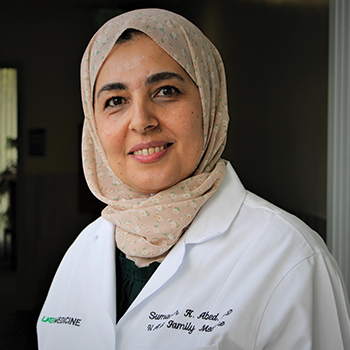
March, celebrated as Women’s History Month, offers us another chance to reflect on women’s health needs and concerns.
UAB Department of Family and Community Medicine providers take pride in addressing these unique needs with personalized care for female patients, including everything from important preventative screenings to advice for conception, pregnancy or infertility. While this has always been a part of the care our providers offer, the department is currently expanding and formalizing its women’s health program, making it easier than ever for female patients to access care.
We spoke with two providers, Erin DeLaney, M.D., assistant professor, vice chair of clinical affairs and quality and medical director of UAB Family and Community Medicine – Highlands, and Sumayah Abed, M.D., assistant professor and clinician at the Hoover Family Medicine clinic, to learn more about women’s health offerings within family medicine.
Q. What are the most important screenings female patients should discuss with their provider?
DeLaney and Abed: Female patients should talk with their provider about the following critically important screenings:
- Cervical cancer screenings with pap smears starting at age 21 and then every three to five years based on age and risk factors
- Breast cancer screening with mammograms starting as early as age 40 for some women
- Sexually transmitted disease (STD) screening for those who are sexually active and higher risk
- Osteoporosis screening with bone density studies starting at age 65 or younger for some women depending on risk factors
- Skin cancer, hypertension and depression screenings for all women, regardless of age.
Q. What are some other questions women should be discussing with their primary care providers?
DeLaney: Important topics to raise include nutrition, exercise habits, sleep habits, questions about supplements or vitamins, cancer screenings, preventative immunizations (particularly Gardasil, the HPV vaccine) and preconception counseling for women preparing to have children.
 Sumayah Abed, M.D.
Sumayah Abed, M.D.
Abed: Besides screening and contraception, family medicine physicians manage many other women’s health-related illnesses, such as PCOS (polycystic ovary syndrome), infertility, vaginitis, STIs (sexually transmitted infections), PID (pelvic inflammatory disease), menstrual and abnormal bleeding disorders, postmenopausal symptoms, preconception health, management of chronic medical diseases during pregnancy and screenings for domestic violence. Patients can bring up concerns about any of these conditions or topics to their family medicine provider.
Q. How has women’s health advanced in recent years to provide a better experience and better outcomes for patients?
DeLaney: Now that we better understand the role HPV plays in cervical cancer, we have been able to offer updated cervical cancer screening recommendations, drastically reducing the number of PAP smears a woman needs in her lifetime. Similarly, changes in breast cancer screening implementation have reduced the number of mammograms a woman may need. The HPV vaccine has also led to a huge reduction in the number of interventions needed for cervical changes.
Abed: In the last few decades there was significant improvement in breast and cervical cancer screening and then decrease in mortality from both cervical and breast cancers. These advances have expanded women’s lifespans. There has also been an increased focus on women’s mental health, as well as decreases in teen pregnancy and smoking rates and rising levels of education for women. Contraception methods have become safer and more easily accessible for women.
There is still room for progress in screening for cervical cancer. Seven percent of women between ages 21-65, which accounts for 8 million American women, have never had a cervical cancer screening with a PAP smear, and more than 11% have had irregular screenings. More than 12,000 American women are diagnosed with cervical cancer each year and more than 4,000 die of it annually. Our goal as family medicine physicians is to reduce deaths from cervical cancer to zero with universal screening that allows for early diagnosis, treatment and care.

Q. Are there any wellness practices you would suggest particularly for women, or for particular concerns?
DeLaney: Women of child-bearing age should make sure they are getting enough folic acid (from fortified foods or vitamins) and vitamin D (from dairy, green leafy vegetables or vitamins) to help support a healthy pregnancy. As women approach menopause, they should make sure they are getting plenty of calcium and vitamin D to support bone health. For all women, I recommend limiting red meat, eating plenty of vegetables, fruits and whole grains, avoiding sugar-sweetened beverages, choosing low-fat or skim dairy products and limiting eating out.
Abed: Women often take care of their whole family but sometimes forget themselves. I encourage my female patients to take some free time for themselves, often by doing exercise for 30 minutes per day, five times weekly. This helps you stay fit, relaxed and enjoy a good night’s sleep.
Q. How is the Department of Family and Community Medicine expanding and growing women’s health offerings in our clinics?
DeLaney: We have many providers who perform women’s health services and procedures, with a list of services that each provider offers. We are preparing to have a women’s health clinic session so that providers can refer patients to this clinic to be seen in a timelier manner or to have a procedure or counseling done if their regular provider is not able to perform something. We are also preparing to offer our patients pre-natal care in collaboration with UAB Obstetrics and Gynecology. Overall, women can expect to have their needs met with excellent care.
Abed: By establishing a women’s health program, we will deliver comprehensive care for women of all stages of their life, providing gender-specific care and very skilled health management. The female patient should expect to meet a provider who is ready to answer all of her questions and address her concerns.
We are also looking forward to starting hand-on training of medical students in women’s health issues, and to seeing family medicine residents spend more time in women’s health training.